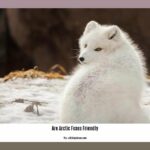Contrary to popular belief, foxes don’t hibernate. These cunning creatures remain active year-round, relying on remarkable adaptations and resourceful hunting techniques to thrive, even when winter blankets the landscape in snow and ice. Let’s delve into the fascinating world of foxes and uncover the secrets of their winter survival.
Staying Warm Without Hibernation: A Fox’s Winter Toolkit
While some animals slumber through the colder months, foxes have evolved a different strategy: outsmarting winter with an array of physical and behavioral adaptations.
A Built-in Winter Coat
As temperatures drop, foxes undergo a transformation, shedding their lighter summer coat for a luxurious winter one. This dense, fluffy fur provides exceptional insulation, keeping them warm even in sub-zero conditions. Their bushy tails play a crucial role too, acting as a built-in scarf they wrap around themselves for extra warmth.
Dens: More Than Just a Hole
Foxes are expert burrowers, creating underground dens that offer refuge from harsh weather. These dens are more than just a place to sleep; they provide a stable, insulated environment where foxes can conserve energy, raise their young, and escape predators. Some foxes even utilize snow to their advantage, allowing it to accumulate atop their dens for additional insulation.
Fueling Up for the Freeze
Just as we might stock up on supplies before a winter storm, foxes spend the fall building up fat reserves. This crucial layer of fat provides energy and insulation, helping them power through lean periods when food is scarce.
Winter Wonderland Activities: Beyond Just Survival
Winter isn’t a time for rest in the fox world. It’s a season bustling with activity, from finding food to raising a family.
Love Conquers All, Even Cold
While it might seem counterintuitive, winter is mating season for many fox species. This timing strategy ensures that their kits are born in the spring when food is more abundant, giving them a head start on survival.
The Art of Winter Hunting
Foxes are opportunistic hunters, and their keen senses are amplified in winter. Their exceptional hearing allows them to detect the faintest rustle of prey beneath the snow, while their sharp sense of smell guides them to hidden food sources. Some foxes even perform a captivating hunting technique known as “mousing,” where they leap high into the air and plunge into the snowdrifts to ambush rodents.
Territorial Disputes: Winter Warfare
Winter is a time when foxes are particularly protective of their territories. With resources potentially limited, they become more active in marking their boundaries and fending off rivals, ensuring access to essential food and denning sites.
The Bigger Picture: Why Foxes Don’t Hibernate Matters
The fact that foxes don’t hibernate has significant ecological implications. As ever-present predators, they help regulate prey populations, playing a crucial role in maintaining a balanced ecosystem. Their year-round activity also contributes to seed dispersal and nutrient cycling, further highlighting their importance in their environment.
Do Foxes Migrate? Following the Food, Not Fleeing the Cold
While some fox species may shift their ranges slightly during winter, this isn’t a true migration like we see with birds. Instead, it’s more about resource availability. If food becomes scarce in their usual territory, foxes may wander in search of areas with better foraging opportunities. However, this isn’t a universal behavior among foxes; it depends on the specific species and their local environment.
Unraveling the Mysteries: Ongoing Research
Scientists are still unraveling the complexities of fox winter ecology. There’s much to learn about how varying snow depths, prey availability, and changing climate conditions influence fox behavior and survival strategies.
Foxes: Masters of Adaptation
The next time you find yourself bundled up against the winter chill, remember the unassuming fox. This clever creature, with its thick fur, resourceful hunting strategies, and cozy dens, demonstrates that survival isn’t just about enduring the cold; it’s about embracing it. Foxes challenge our assumptions about hibernation and remind us of the incredible adaptability of the natural world.
Do you have a burning question about whether grizzly bears have the ability to climb trees? Discover the surprising truth behind their remarkable tree-climbing skills, and be amazed by their agility and strength. do grizzly bears climb trees
- Unveiling the Enigma: Mansoureh Khojasteh Bagherzadeh’s Public Appearances & Private Life in Iran - July 18, 2025
- Unveiling the Mystery: Mansoureh Khojasteh Bagherzadeh’s Husband: A Rare Glimpse into a Private Life - July 18, 2025
- Unveiling Masoud Khamenei’s Mother: Power, Influence, and Iran’s Future - July 18, 2025
















